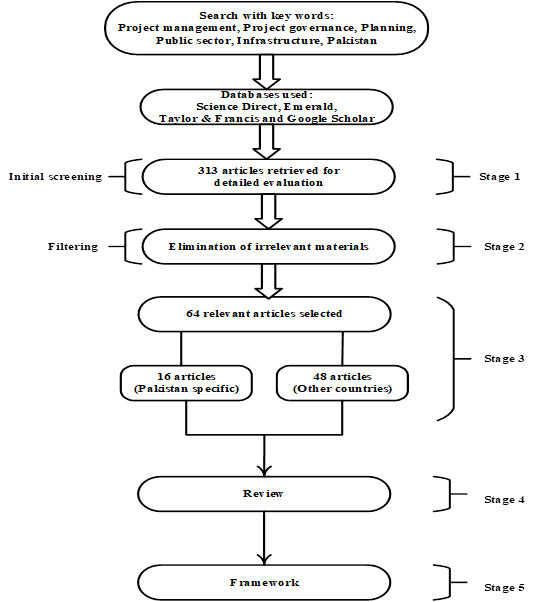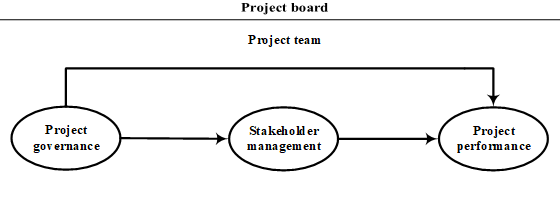Abstract
Project governance has become an important subject matter for both the project management environment and the public sector, due to the demands for enhanced project performance. Project professionals in developing countries encounter various challenges while execution of the projects. This paper has analyzed previous studies on Infrastructure development projects and project management practices in Pakistan published in academic journals and conference proceedings. The study reveals the organizational shortfalls and various challenges in the procedures adopted for planning and managing infrastructure projects. As the infrastructural development projects play a key role in the economic growth of developing economies like Pakistan, successful implementation of the projects is, therefore, not only essential but inevitable to achieve development goals. This study identifies the shortcomings and proposes project governance framework for infrastructure development projects, which will enhance the project performance and facilitate the various public-sector organizations, donor agencies involved in policy-making, planning and implementation of development projects.
Keywords: Project planninginfrastructureproject managementproject governancepublic sectorPakistan
Introduction
Infrastructure projects are unique, innovative and complex in nature because they involve an array of tangible and intangible factors of distinctiveness nature (Choudhry, Aslam, Hinze, & Arain, 2014). They usually have lengthy timelines with varying uncertainties and multifaceted affiliations among stakeholders (Guo, Chang-Richards, Wilkinson, & Li, 2014). Nevertheless, meeting infrastructural needs is vital for the economic growth of any country. Typically, sets of diverse stakeholder’s cycle into and out of involvement as projects move from initiation to implementation, leading to even greater fragmentation. It is due to these complexities that these projects are fraught with conflicts that often contribute to their failure. Furthermore, infrastructural development projects are heavily dependent upon social interactions and are considered to be highly transient human systems. It has been observed that the uncertainties involved in these projects are not being addressed and managed professionally. Therefore, to enhance the efficiency of infrastructure projects, there is a dire need to deal with the ambiguities in an integrated manner to accomplish the success of the project in terms of effective governance.
In Pakistan, the government has taken various measures through Ministry of Planning, Development & Reforms who undertakes the responsibility of planning and implementing infrastructural development projects. Review of various studies on Pakistan’s planning system suggests different measure for enhancing productivity and efficiency. However, in this context, no detailed review on the governance of public sector infrastructure projects for the country was found in the available literature
Problem Statement
Public sector development projects contribute to national economy at a great magnitude but the projects are not managed well even after following the established project management principles (Patanakul, Kwak, Zwikael, & Liu, 2016). Like other nations, Pakistan is also facing project management issues where the research on project governance in public sector infrastructure projects is insignificant. Governments are making efforts to improve the performance of the development projects but no significant improvement has been attained so far in the performance (Ahmed & bin Mohamad, 2014). The review studies on public sector infrastructure projects of Pakistan shows the research gap pertaining to lack of continuity in the process of project governance and hybrid model for decision making. However, the researchers have not addressed the theme of project governance thoroughly and there are limited studies in the literature this context. This research gap was a major trigger for identifying this study and has highlighted the need to develop conceptual framework for project governance in public sector infrastructure project
Purpose of the Study
Execution of public sector infrastructural projects has gained much attention in developing economies like Pakistan. Countries are adopting new strategies and frameworks for execution of the public sector infrastructure projects. Conducting a research on the specific area of project governance is not only challenging but interesting as well.
In Pakistan, unfortunately, research on project governance of public sector infrastructure projects is a much-neglected sphere. The key objective of the study is to propose a project governance framework for better implementation and performance of public sector infrastructure projects. The framework is intended to benefit planners, policymakers and scholars of project planning and management
Research Methods
In order to attain the objective of the study, a systematic review of the previous studies on project management, planning and governance in the context of public sector organizations of Pakistan was carried out through an extensive search of the literature. The chronological and interpretative approach was used and the review process offers an inclusive summary of the topic area (Grant & Booth, 2009). Data were then thematically evaluated to classify and report the hidden and apparent patterns in the content (Vaismoradi, Turunen, & Bondas, 2013). The search criteria considered for inclusion of relevant and appropriate research studies were based on:
•Issues and challenges pertaining to project management planning and governance practices within a public sector environment of Pakistan and other developed countries.
•Articles for the review were from scholarly databases i.e. Science Direct, Emerald and Taylor Francis Online database. Initially research articles related to Project Management were gathered and consequently, those relating to public sector infrastructure projects of Pakistan were filtered using any of the key phrases “Project Management”, “Public sector infrastructure projects”, “Project Planning” and Project Governance” within the article title, abstract or keywords.
•Google Scholar was also used to classify the research articles which exist within the scope of this study.
Figure

Findings
Project governance has emerged as a new standard of governance for the enhancement of project performance (Crawford et al., 2008a). It is a structures which offers a well-defined relationship between the project outputs and the organizational business strategy (Too & Weaver, 2014). Project related activities in corporate governance are the areas of concern for the project governance (APM, 2011). In other words, the project governance is directly involved in the performance of the project. Many researchers have claimed that the lack of effective project governance is one of the main cause of poor project performance (Crawford et al., 2008b; Fein, 2012). Project governance has been suggested as an approach to enhance the performance of the project (Fein, 2012).
As an operational approach development of project governance framework is necessary for the implementation and resource allocation for the projects. Through better use of project governance in strategic perspective, the efforts for aligning project outputs to general strategy can be easily achieved, and it is basically about leadership selection, incentives, control systems and monitoring (Hjelmbrekke, Klakegg, & Lohne, 2017). For successful completion of the projects and projects- based organizations standardized strategy is recommended (Müller, Zhai, & Wang, 2017). Community participation, stakeholder engagement, empowering the workforce can be used as an effective instrument to support decision making and implementation of projects through governance. A comprehensive project governance environment needs a strong management support from the project board. Multiple-stakeholders are a characteristic of all the public sector infrastructure development projects. An emphasis on stakeholder engagement through a project governance framework can boost up the performance of the ongoing as well as future projects.
Considering the gaps in the literature and based on the related theories a project governance, a framework is developed to encapsulate the significance of project governance and stakeholder management on the performance of public sector infrastructure projects. Figure

Conclusion
A proper project governance mechanism is essential for the public sector infrastructure development projects in Pakistan to attain potential future benefits. The mechanism will ensure the representation of minority as well as majority viewpoints of the stakeholders and confer legitimacy on decisions related to the projects. Without proper governance mechanism, only the loudest voices get heard and the possibility of crises and project failure is also higher. The proposed project governance framework will help in overcoming the deficiencies and hazards related to the public sector infrastructural development projects in Pakistan.
Pakistan needs to establish a reliable, independent and comprehensive long-term planning mechanism to strengthen and implement the development projects. The strategy must be evolved with a clear vision and commitment to the development of public sector infrastructure project. The process may take as long as a decade, but there are no shortcuts. However, a start must be made if the government wants to continue targeting high growth rates in the future. In this regard, Planning commission of Pakistan should be given full autonomy to establish transparent and accountable project governance and planning process. The bureaucratic complication, corruption, and nepotism have to be wiped out for administrative efficiency. There is need to develop a mechanism of accountability and sufficient allocation of resources during the planning process.
This review has opened avenues for further research in project governance practices in the public sector infrastructure projects in other developing countries. A more pragmatic research is envisaged to broaden the understanding of governance framework within project-based organizations to have a deeper insight into the management practices
Acknowledgments
The authors would like to acknowledge the financial support by Universiti Malaysia Pahang under the internal grant RDU170312 for this research work.
References
- Ahmed, R., & bin Mohamad, N. A. (2014). Performance of projects in public sector of Pakistan: Developing a framework for future challenges. Serbian Project Management Journal, 4(1), 3-12.
- APM. (2011). Directing Change: A Guide to Governance of Project Management (second ed. ed.). Ibis House, Regent Park, UK.: Association for Project Management
- Choudhry, R. M., Aslam, M. A., Hinze, J. W., & Arain, F. M. (2014). Cost and schedule risk analysis of bridge construction in Pakistan: Establishing risk guidelines. Journal of Construction Engineering and Management, 140(7), 04014020.
- Crawford, L., Cooke‐Davies, T., Hobbs, B., Labuschagne, L., Remington, K., & Chen, P. (2008a). Governance and support in the sponsoring of projects and programs. Project Management Journal, 39(S1), S43-S55.
- Crawford, L., Cooke‐Davies, T., Hobbs, B., Labuschagne, L., Remington, K., & Chen, P. (2008b). Governance and support in the sponsoring of projects and programs. Project Management Journal, 39(S1).
- Fein, M. R. (2012). Tunnel Vision: “Invisible” Highways and Boston’s “Big Dig” in the Age of Privatization. Journal of Planning History, 11(1), 47-69.
- Grant, M. J., & Booth, A. (2009). A typology of reviews: an analysis of 14 review types and associated methodologies. Health Information & Libraries Journal, 26(2), 91-108.
- Guo, F., Chang-Richards, Y., Wilkinson, S., & Li, T. C. (2014). Effects of project governance structures on the management of risks in major infrastructure projects: A comparative analysis. International Journal of Project Management, 32(5), 815-826.
- Hjelmbrekke, H., Klakegg, O. J., & Lohne, J. (2017). Governing value creation in construction project: a new model. International Journal of Managing Projects in Business, 10(1), 60-83.
- Müller, R., Zhai, L., & Wang, A. (2017). Governance and governmentality in projects: Profiles and relationships with success. International Journal of Project Management, 35(3), 378-392.
- Patanakul, P., Kwak, Y. H., Zwikael, O., & Liu, M. (2016). What impacts the performance of large-scale government projects? International Journal of Project Management, 34(3), 452-466.
- Too, E. G., & Weaver, P. (2014). The management of project management: A conceptual framework for project governance. International Journal of Project Management, 32(8), 1382-1394.
- Vaismoradi, M., Turunen, H., & Bondas, T. (2013). Content analysis and thematic analysis: Implications for conducting a qualitative descriptive study. Nursing & health sciences, 15(3), 398-405.
Copyright information

This work is licensed under a Creative Commons Attribution-NonCommercial-NoDerivatives 4.0 International License.
About this article
Publication Date
02 August 2019
Article Doi
eBook ISBN
978-1-80296-064-8
Publisher
Future Academy
Volume
65
Print ISBN (optional)
-
Edition Number
1st Edition
Pages
1-749
Subjects
Business, innovation, sustainability, environment, green business, environmental issues
Cite this article as:
Khan, A., Khan, M. W. A., Ismail, I., Adeleke, A. Q., & Ahmed, I. (2019). Conceptual Framework for Project Governance of Public Sector Infrastructure Project In Pakistan. In C. Tze Haw, C. Richardson, & F. Johara (Eds.), Business Sustainability and Innovation, vol 65. European Proceedings of Social and Behavioural Sciences (pp. 74-79). Future Academy. https://doi.org/10.15405/epsbs.2019.08.8

